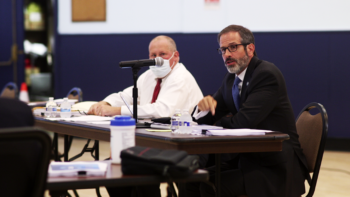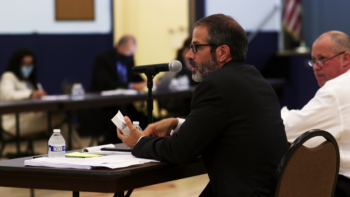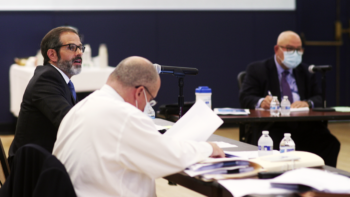Union wins three more months of healthcare and structured severance pay for workers from IWA and Division A shops in landmark arbitration

Friday, September 11, 2020 7:31 PM
Updated Monday, November 16, 2020 12:16 PM
HTC President Maroko announced that the Union has won two major victories in a landmark arbitration decision that was issued this morning. This decision applies to approximately 28,000 HTC-represented workers at IWA and Division A shops.
The arbitrator’s decision consists of two parts:
Part 1 of Decision – Three-Month Extension of Healthcare
The arbitrator’s decision requires IWA and Division A employers to pay for an additional three-month extension of healthcare coverage for employees who are still on layoff as a result of the pandemic. Those workers are now guaranteed healthcare through the end of 2020.
Part 2 of Decision - Supplemental “Bridge Payments” in Severance Pay
Most employees from those same IWA and Division A shops (who would be entitled to severance pay in the event the shop permanently closed) will soon be entitled to extra pay each week to supplement their unemployment benefits as a structured payout of severance. Workers will receive these weekly checks, or “bridge payments”, that will make up the difference between unemployment benefits, any federal supplement, and their regular weekly wages until either (1) they are recalled or (2) they are paid an amount in bridge payments that equals the amount of severance pay they would otherwise receive had their hotel permanently closed. Hotels have the right to make a one-time decision to pay the severance out in a lump sum payment, as opposed to bridge payments, which means those workers would get the entirety of their severance entitlement (minus statutory deductions) in one check. These payments will have no effect on employees’ recall rights.
Negotiations and Arbitration
As President Maroko explained, “The two most pressing concerns our laid off members have are access to healthcare and having enough income to get by if and when federal unemployment subsidies are reduced or end altogether. Today, we were able to address both.”
The Union resumed negotiations over these issues with the industry several weeks ago. President Maroko reported that while those negotiations were productive, the industry wasn’t able to resolve the issues of continued healthcare and extra income to the Union’s satisfaction. As a result, the Union took the case to arbitration.
The arbitration – the first non-remote, in-person hearing since the pandemic began – was held in the Union’s Gertrude Lane Auditorium on September 1, 2020. President Maroko, who is also an Ivy League-educated lawyer and previously served as the Union’s General Counsel for nearly 20 years, presented the case, alongside longtime outside Union counsel, Joseph Farelli, and Union Generals Counsel Amy Bokerman and Alyssa Tramposch.

The Arguments of Both Sides
With regard to healthcare, the Union relied on contractual provisions that the Union had negotiated over time to protect the solvency of the health fund and some obscure arbitration awards interpreting them to argue that hotels were required to pay assessments to bolster the health fund. The arbitrator ultimately agreed and awarded three additional months of healthcare for the months of October, November, and December. This is no small feat; the monthly cost of providing benefits is just under $50 million.
Normally, neither the IWA nor Division A contracts require employers to pay for healthcare for employees who are not working. But HTC’s power and the strength of our contract language gave the Union the tools it needed to secure a total of nine extra months of healthcare coverage during this pandemic through negotiation and arbitration, totaling nearly $350 million.
The Union’s argument with respect to supplemental income centered on the severance provisions of the contracts. These provisions provide for severance pay in the event of closures or permanent layoffs. The ndustry argued that the severance provisions didn’t apply in the context of layoffs caused by the effect of the pandemic on the ndustry.
Specifically, they argued that severance is only due for “permanent” closures and “permanent” layoffs, and that it does not normally apply in cases of layoffs resulting from a lack of occupancy – as is the case now, with travelers staying home for fear of contracting COVID-19.
They also argued that even if severance were required, it should not be paid until unemployment runs out, which, for most, isn’t likely to occur until the spring of next year, thanks to federal and state extensions of unemployment benefits.
The Union countered that it had negotiated severance specifically to cushion the impact of long-term layoffs, and that workers were in desperate need of extra income now, all the more so given that federal supplements to unemployment are ending coupled with the uncertainty of any congressional action to extend it.
Ultimately, the arbitrator agreed that some severance should be paid even if hotels were not “permanently” closed and that the payout could not wait until next spring.

No Help from the Republican Senate and White House
It has been obvious for months that the Republican-controlled U.S. Senate had no intention of passing a real relief bill to assist the millions of workers who are out of work due to the pandemic and the inept federal response to it, even though the Democratic-controlled House of Representatives acted promptly by passing the HEROES Act in May which would have extended enhanced unemployment benefits until January 31, 2021.
Severance Bridge Payments
Workers covered under the IWA or Division A CBA who would otherwise be entitled to severance pay if their hotel closed will be able to use this “bank” of severance pay to collect weekly checks, called “bridge payments,” to supplement their unemployment benefits. This weekly “bridge payment” will be deducted from an employee’s total “severance bank.” This means that the more years of service an employee has with a hotel, the larger their “severance bank.” Once an employee receives his or her full allotment of bridge payments totaling their “severance bank”, the bridge payments end.
How to Calculate Your Total “Severance Bank”
For most employees, severance is calculated by multiplying their regular hourly rate by the number of hours worked per day, multiplied by four days, and then multiplied by years of service (assuming the employee has been employed for at least six months before being laid off under the IWA or at least one year under the Division A CBA). For tipped employees, severance is calculated at the contractual benefit day rate of two times their regular hourly rate. For employees under the Division A CBA with more than five years of service, the multiplier is five days per year of service instead of four days per year of service.
So, for example, a laid off Room Attendant who worked at an IWA hotel for 10 years would calculate their severance bank by multiplying their daily rate by four and then multiplying that amount by their years of service as follows:
$34.87 (hourly rate) x 7 (hours per day) x 4 (days per year of service) x 10 (years of service) = $9763.60 total severance bank
You can use this calculator to estimate how much your total “severance bank” will be.
Important note: When estimating the value of your severance bank, employees should use their pay rate as of their last day of work. If an employee received any payments after July 1, 2020, including but not limited to PTO, or was provided with a WTPA Notice (notice of pay rate change), severance pay is based on their July 2020 wage rate.
Another note: If an employee has been paid severance in the past from the hotel where they currently work, they will not receive severance for each year of service at the hotel, only from the date they received the original severance.
For example, if a Server at the Oak Room at the Plaza Hotel has worked at the Plaza for 35 years, and received severance for 25 years of service in 2010, today, they are only entitled to 10 years of severance pay (35 years total - 25 years paid).
Another note: Your years of service should be rounded to the nearest quarter year.
How to Calculate Your “Bridge Payments”
From October 1, 2020 until January 1, 2021, bridge payments to laid off workers will be the difference between unemployment benefits received, including any federal supplements, and the amount an employee would normally earn during his or her paid time off (e.g., at their benefit day rate).
So, for example, a room attendant who normally earns $1220 per week and receives $804 per week in unemployment benefits ($504 in regular unemployment benefits and another $300 in federal supplements) would receive weekly bridge payments of up to $416 while on layoff, provided they had enough in their severance bank.
On January 1, 2021, the cap on bridge payments increases by another $443 per week, which will roughly equal the monthly amount needed for an employee to buy continued family healthcare coverage under COBRA.
As each weekly bridge payment is paid out, it will reduce an employee’s severance bank by that amount. Once the total severance bank is depleted, bridge payments will end. If a hotel reopens, then closes again in the future, the amount paid out to an employee as severance in bridge payments will be deducted from that employee’s total severance bank.
On June 1, 2021, which is the date extended unemployment benefits are likely to end, workers who are still on lay off can choose to either (1) continue receiving the weekly bridge payments, or (2) be paid out a lump sum payment of whatever is left in their severance bank.
Bridge Payments Do Not Affect Your Unemployment Benefits
According to the New York State Department of Labor, such structured severance will not affect continued eligibility for unemployment insurance benefits or benefit amounts, so long as the first severance payment is made more than 30 days after an employee’s last day of work. This is because it is a structured payout of severance, and not wages. So long as you remain ready, willing, and able to be recalled to work, these severance payments simply won’t affect unemployment benefits. However, if you would prefer for any reason either not to be paid bridge payments, or not to receive the increase to bridge payments that is effective in January, you may decline.
This award does not apply to shops that have already paid out severance to employees during the pandemic. Nor does it apply to shops with contracts other than the IWA or Division A CBA, including, but not limited to the clubs and casinos.
Neither Bridge Payments Nor Lump Sum Severance Will Affect Your Right to Be Recalled
Keep in mind that even if you are paid out the entire amount you would be entitled to as severance, either as a lump sum or by bridge payments, you are still entitled to be recalled when business comes back: it only means that you will no longer receive any more bridge payments.
Union Wins Severance Pay for Workers Covered by the GRIWA
On September 23rd, our Union also won severance
pay for laid off workers covered by the Greater
Regional Industry Wide Agreement (“GRIWA”).
After weeks of negotiations with the hotel
industry, the Union filed for a hearing before
the arbitrator. We argued that under Article
55 of the GRIWA, workers who have been
laid off for the last six months due to the pandemic are now entitled to severance pay. The
arbitrator agreed.
Just like those severance payments going to workers laid off at IWA and Division A hotels, the severance pay awarded to workers in hotels signed onto the GRIWA will be paid out in the form of weekly “bridge payments” and will have no effect on your seniority, recall rights or on unemployment benefits. As soon as the industry recovers and your work becomes available again, you will be recalled in order of seniority.
How to Estimate Your Total Severance Bank (GRIWA)
Under Article 55 of the GRIWA, eligible workers are entitled to 5 days of severance pay, at their benefit day rate, for each year of service.
So, for example, a laid off room attendant who
worked at a GRIWA hotel for 10 years would
calculate his/her severance bank by multiplying
their daily rate by 5 and then multiplying that
amount by their years of service as follows:
$18.40 (hourly rate) x 7 (hours per day) x 5 (days per year of service) x 10 (years of service) = $6,440 total severance bank.
Call Your Business Agent with Any Questions
About this Award
If you have any questions about the applicability of the award to you specifically or to your hotel generally, or if you have questions about the calculations, please call (212)-245-8100 and select option #1 to leave a message for your business agent.


